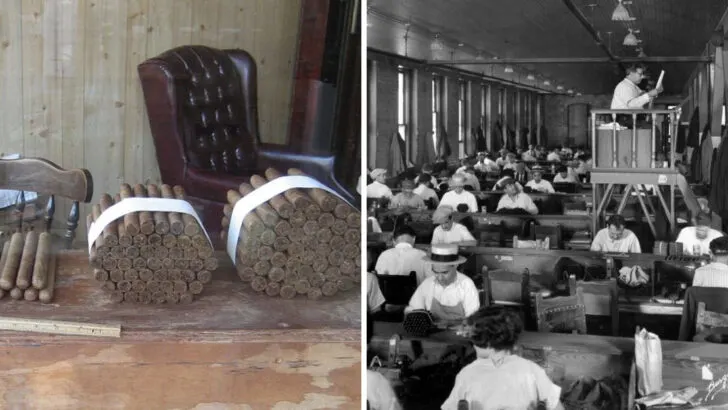Ybor City, nestled in Tampa, Florida, carries a rich tapestry of Cuban and Spanish influences woven through its storied cigar-making heritage.
This vibrant district houses relics of the past and celebrates a tradition that once crowned it the “Cigar Capital of the World.”
From historic landmarks to lively festivals, Ybor City is a testament to its enduring legacy.
Here are 11 intriguing facets of this unique neighborhood.
Vicente Martínez-Ybor’s Vision
Vicente Martínez-Ybor, a visionary in the cigar industry, moved his operations from Key West to Tampa in the 1880s. This relocation was prompted by labor unrest and logistical challenges.
In Tampa, he found an ideal environment to establish a thriving industry. The establishment of the Ybor Cigar Factory laid the groundwork for what would become a bustling immigrant community.
Ybor’s decision catalyzed Tampa’s transformation into a key economic hub, attracting thousands of workers seeking new opportunities.
Cuban and Spanish Immigration Waves
The promise of employment in Ybor City drew skilled torcedores from Cuba and Spain. These artisans brought not only expertise but also rich cultural traditions.
Their influence permeated through the community, infusing it with vibrant customs, cuisine, and music. This cultural blend created a uniquely diverse neighborhood.
The exchange of ideas and traditions nurtured a dynamic environment, fostering innovation and community spirit.
The Growth of “Cigar Capital of the World”
Ybor City’s rapid growth turned it into a world-renowned center of cigar production. At its zenith, the district housed over 200 factories, producing millions of cigars annually.
This booming industry earned Ybor City its moniker, “Cigar Capital of the World.” The economic impact was profound, shaping Tampa’s development.
Skilled craftsmanship and high-quality production attracted international attention, cementing Ybor’s global reputation.
The Role of the Lector
In the heart of the factory, the lector held a unique role, reading aloud to entertain and educate workers. This tradition enriched the intellectual and cultural life of employees.
Lectors read newspapers, literature, and political writings, stimulating thought and discussion. Their presence was a cherished element of daily factory life.
This practice fostered a well-informed workforce, bridging the gap between labor and the larger world.
Mutual Aid Societies
Organizations like El Centro Español and El Circulo Cubano provided vital support for immigrants. These mutual aid societies offered healthcare, social services, and cultural connection.
They became pillars of the community, providing a sense of identity and belonging. Members found solidarity and support in these spaces.
These societies played a crucial role in integrating immigrants into their new environment while preserving cultural heritage.
Community Life in a Factory Town
Around the cigar factories, a lively community emerged, filled with cafés, social clubs, and markets. These venues became social and cultural hubs.
Residents from diverse backgrounds mingled, sharing stories, food, and traditions. This vibrant mix fostered a sense of unity and community pride.
The pulse of everyday life was felt on the streets, where the aroma of cigars mingled with the rich scents of Cuban and Spanish cuisine.
Historic Cigar Factories and Landmarks
Ybor City’s landscape is dotted with historic cigar factories and landmarks. Efforts to restore these iconic buildings, like the Ybor Cigar Factory and El Reloj, are ongoing.
These structures serve as tangible links to the past, preserving the architectural and cultural heritage of the area. They are symbols of a bygone era.
Restoration projects aim to maintain the district’s historic character while promoting tourism and education.
Cigar Shops and Hand-Rolling Demonstrations
Today, Ybor City is home to cigar shops where traditional techniques are alive and well. Artisans hand-roll cigars, showcasing craftsmanship to visitors.
These demonstrations offer a glimpse into the past, allowing people to appreciate the artistry and skill involved. It’s a tactile connection to history.
The shops contribute to the district’s charm, drawing both tourists and locals who seek an authentic experience.
Museums and Walking Tours
Ybor City offers museums and walking tours that delve into its immigrant and cigar-making history. The Ybor City Museum is a treasure trove of artifacts and stories.
Guided tours lead visitors through the district, unraveling tales of its vibrant past. These experiences educate and engage the community and tourists alike.
They serve as a bridge between generations, ensuring the legacy of Ybor City continues to inspire.
Annual Cigar and Heritage Festivals
Ybor City hosts annual festivals celebrating its rich cigar and cultural heritage. These events feature cigars, music, food, and traditional crafts.
Visitors are treated to a sensory feast, with the aroma of tobacco mingling with the sounds of live performances. It’s a vibrant celebration of history and culture.
Such festivals foster community spirit and attract visitors from all over, keen to explore Ybor’s unique charm.
Ybor City as a Living Museum
Ybor City stands as a living museum, where the past meets the present. Its streets are alive with history, echoing the footsteps of those who came before.
The district’s architecture, festivals, and community life reflect a continuous celebration of its immigrant and artisanal past. It’s a blend of old and new.
This vibrant neighborhood remains a testament to the enduring spirit of its founders and the cultural melting pot they created.

